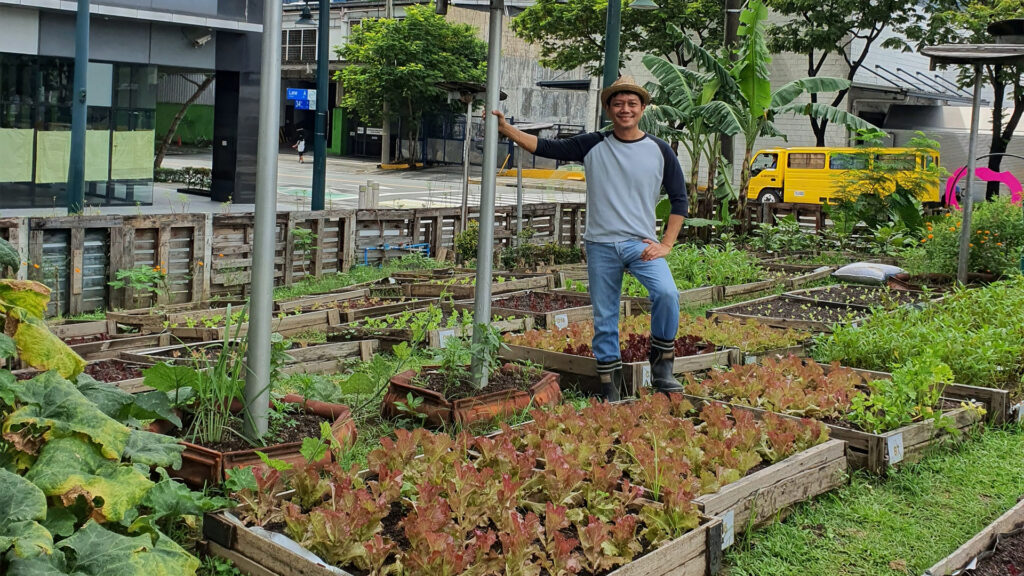The concept of farming is being shaken by multiple factors, such as climate change, shrinking agricultural land and aging farmers in the countryside, so why not bring farms where the action is.
Louie Gutierrez, managing partner of jewelry brand SilverWorks and founder of Urban Farmers PH, is building the next farms in skyscrapers-filled cities to ensure that food is always within every Filipino’s reach.
“The more farmers there are, the more people selling and eating vegetables, the happier we are. We want to create awareness of sustainable agriculture,” Gutierrez told Daily Tribune.
Gutierrez realizes this goal through one of his urban farms in the Bonifacio Global City or BGC in Taguig City where rows of leafy vegetables, herbs and other plants grow on a 1,500-square meter lot.
In a visit to his BGC farm last Wednesday, Gutierrez said that his community of urban farmers is growing. They include disciples in public schools and corporate towers.
He shared that his team is working with Kenny Rogers Roasters to build an edible garden at Barrio Obrero Elementary School in Tondo, Manila City and another at Taguig Integrated School.
Green everywhere
“We always need young blood. If I work only with peers of the same age group, who will continue our advocacy when I die?” Gutierrez said.
To encourage people to plant, Urban Farmers PH set up in January an edible garden within the compound of San Miguel Corporation in Ortigas Center, Mandaluyong City.
“It’s really good that we’re inspiring big businesses to take up the cause because we are just a small social enterprise and non-government organization with limited funds,” Gutierrez said.
Since the pandemic, Urban Farmers PH has been run by 10 farmers and 23 volunteers.
Gutierrez said the BGC farm has given hope to agriculturists and enriched time spent by families who might be falling into sedentary lifestyles in their condominium units.
“Many parents want to teach their kids about farming so they rent a plot and we help them grow their plants. They have this cycle of planting and harvesting,” he explained.
“This is a fun activity for kids rather than being glued to their phones. The BGC farm is their playground,” he said.
Back to basics
Gutierrez said around 10,000 people have participated in farming workshops Urban Farmers PH held after it created its first farm in Bel-Air, Makati City.
The idea of urban farms emerged when employees of SilverWorks were forced out of work by the pandemic and the company tried to find ways to help workers to continue having food on their table.
“My 70 stores in malls closed as everyone stayed at home. I was then just staring at the wall because we were in lockdowns. But I found this empty lot in our village,” Gutierrez recalled.
With guidance from agriculturists, his team now has two farms in Bel-Air. One is dedicated to the barangay and spans 200 square meters The other is his village farm with 500 square meters.
“Weekdays are mostly dedicated to companies and schools. Schools do their field trips here and we teach them biodiversity and many more — whatever topic that fits in the sustainability agenda,” Gutierrez said.
Through the urban farms, he said many agriculturists became active in their natural environment a stone’s throw away from glass skyscrapers and other business structures.
“We have agriculturists living in the city who did not have jobs fit for them and sadly most of them end up working at fastfood chains,” Gutierrez said.
“Now they have the option to practice their profession, they now have jobs at urban farms,” he stressed.
Sustainability, next
Moving forward, Gutierrez is planning to build an integrated composting facility on a 650-square-meter lot near Nepa Q-Mart in Quezon City to make fertilizers out of food waste.
He said this will be open to the public so they can learn various ways of composting.
“We can demonstrate bokashi composting which you can do in your house and vermicomposting for communities,” Gutierrez said.
Through this facility, he said farming costs can be reduced while helping the country achieve zero waste.
“BGC restaurants are segregating waste on their own. But when these get into the entire collection of garbage trucks, we don’t know where the food wastes go afterward,” Gutierrez explained.
“We have to solve that next step. I want all restaurants here to bring their food wastes to us and turn them into compost and ultimately bring them to farmers,” he added.
